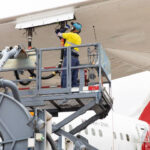The UK Department for Transport has awarded a total of £63 million ($85m) under its Advanced Fuels Fund (AFF) to 17 sustainable aviation fuel production startups, bringing overall financial support after three rounds up to £198 million ($267m). The AFF competition provides grant funding to first-of-a-kind commercial demonstration-scale projects in the UK at development stages up to construction starting, with projects having to demonstrate their potential to produce SAF capable of reducing emissions by more than 65% on a lifecycle basis compared with conventional fossil jet fuel. The biggest awards went to LanzaJet UK’s Project Speedbird (£10m), Alfanar Energy’s Lighthouse Green Fuels (£8m), LanzaTech UK’s DRAGON 1&2 (£6.4m) and Carbon Neutral Fuels’ ASAP-DAC (£6m). Meanwhile, a new European consortium planning a SAF production facility in the UK has decided it is now unlikely to proceed with the project, citing a failure to win AFF funding in the latest window.
The UK government said the third window funding would support around 1,400 jobs, with low-carbon fuel production potentially adding up to £5 billion to the economy by 2050 and positioning the UK as a global hub for SAF production.
Announcing the latest funding awards at the University of Sheffield’s Energy Innovation Centre, which received £1.5 million in the latest round towards developing a SAF demonstration plant, Aviation Minister Mike Kane described the funding as a “lift off for Britain’s green aviation revolution”.
The 17 projects awarded funding are:
• Alfanar Energy (£8m) – The Lighthouse Green Fuels project is developing a commercial-scale plant that uses torrefaction with gasification and Fischer-Tropsch (FT) synthesis technology to convert sawmill and forestry residues into SAF.
• Altalto Immingham (£3m) – The project is developing a commercial-scale plant that uses gasification and FT technology to convert municipal solid waste into SAF.
• British Sugar (£2.6m) – The British BioJet project is developing a commercial-scale plant that uses ethanol-to-jet technology to convert sugar beet betaine residue bioethanol into SAF.
• Carbon Neutral Fuels (£6m) – The ASAP-DAC project is developing a commercial-scale plant that uses solid oxide electrolysis and FT technology to convert low carbon electricity and CO2 from direct air capture and biogenic sources into SAF.
• Equilibrion (£1m) – The Eq.flight project is developing a demonstration plant that uses solid oxide electrolysis, reverse water-gas shift and FT technology to convert direct air capture CO2, local heat sources and nuclear electricity into SAF.
• Equinor Low Carbon UK (£3m) – The Humber SAF Project is developing a commercial plant that uses methanol-to-jet technology to convert biomethanol and renewable e-methanol into SAF.
• Essar Oil (UK) / EET Fuels (£2.5m) – The ESSAR Energy Transition Stanlow Methanol-to-Jet project is developing a large commercial plant that uses methanol-to-jet technology to convert renewable e-methanol and biomethanol into SAF.
• ETFuels UK (£5m) – Project SkyFuel Teesside is developing a commercial-scale plant that uses methanol synthesis and methanol-to-jet technology to convert biogenic CO2 and green hydrogen into SAF.
• LanzaJet UK (£10m) – Project Speedbird is developing a commercial-scale plant that uses ethanol-to-jet technology to convert advanced bioethanol into SAF.
• LanzaTech UK (£6.4m) – The DRAGON 1&2 project is developing two commercial-scale plants, both of which use ethanol-to-jet technology. One will convert recycled carbon fuel ethanol into SAF and another industrial site will turn use partial reverse water-gas shift and fermentation to turn waste CO2 sources and green hydrogen into ethanol for subsequent conversion into power-to-liquid SAF.
• NorthPointe Energy (£2m) – Project Northpoint is developing a commercial-scale plant that uses gasification and FT technology to convert refuse derived fuel into SAF.
• OXCCU TECH (£3.1m) – The project is deploying a small demonstration plant that uses combined catalysis technology to convert biogenic CO2 and green hydrogen into SAF.
• Power2X Solutions UK (£1.5m) – The eFuels Humber project is developing a large commercial plant that uses methanol-to-jet technology to convert renewable e-methanol and biomethanol into SAF.
• SuMo Engineering (£4.2m) – The CLEARSKIES project is developing an end-to-end demo plant using advanced gasification, FT synthesis and gas reforming technology to convert waste to SAF.
• University of Sheffield (£1.5m) – The NEXTGEN-SAF project is developing a demonstration plant that uses biogas-fuelled molten carbonate fuel cell technology for industrial biogenic CO2 capture, combined with renewable electrolysis, reverse water-gas shift and FT technology to produce SAF.
• Willis Sustainable Fuels UK (£2.9m) – The Teesside Carbonshift SAF Project is developing a small commercial-scale plant that uses autothermal reforming and FT technology to convert residue-derived biomethane into SAF.
• Zero Petroleum (£3.5m) – The Fuelling Zero project is developing a small commercial plant that uses reverse water-gas shift and FT technology to convert biogenic CO2 and green hydrogen into high-blend SAF.
The third window funding is aimed at supporting projects between July 2025 and March 2026, helping them to reach key development and commercial milestones.
“Further support is anticipated from the AFF beyond March 2026 and, combined with the government introducing legislative measures to implement a revenue certainty mechanism to support SAF production in the UK, this will enable UK advanced SAF projects to reach Final Investment Decision (FID) and start-up,” said Essar Energy Transition (EET), one of the projects securing funding.
The grant, said EET, would enable it to advance to the Pre-Front-End Engineering Design (pre-FEED) stage. It is targeting completion of pre-FEED by March 2026, with full FEED commencing in Q2 2026 and FID by the end of 2027. The plant’s strategic location at Stanlow, Northwest England, would leverage existing import infrastructure and jet fuel blending capacity for direct supply to UK aviation, particularly at Manchester Airport.
“At Stanlow, we have major decarbonisation ambitions, aiming to become a leading energy transition hub and home to the world’s first low-carbon process refinery,” added Tony Fountain, Managing Director at EET. “With SAF still making up only a tiny fraction of global jet fuel use, our MtJ plant will play a critical role in closing that gap and helping the UK meet its Jet Zero targets.”
Meanwhile, another SAF project earmarked for the region has stalled as a result of not getting AFF support in the third window. The GRAMM project was planned for the Royal Port of Barrow, operated by Associated British Ports, and backed by a consortium that included major European energy and technology partners such as TotalEnergies, Axens and thyssenkrupp (see article). The consortium had said the project would use a French end-to-end technology platform called BioTfuel, and aimed to capture and store 1.5 million tonnes of CO2 during production, “reducing carbon emissions four times more than a benchmark set out in the UK SAF Mandate”.
In a post on his LinkedIn feed, Alexander Peschkoff, GRAMM Consortium Lead, said the partners were “exploring last-minute options to keep the project in the UK.”
He added: “Should these efforts prove unsuccessful, we are evaluating relocation opportunities in the United States, where federal and state-level support for sustainable aviation projects has demonstrated greater consistency and momentum.”
Photo (EET Fuels): The Stanlow refinery in Northwest England

Christopher Surgenor
Editor















More News & Features
News Roundup September 2025
Catagen launches SAF production company and signs offtakes with Ryanair and Shell
ICAO and IRENA launch Finvest platform to connect sustainable aviation projects with financiers
US rebukes ICAO for wasting resources on climate financing initiatives and warns against global levies
Australia announces A$1.1bn incentive scheme to drive local production of low carbon fuels including SAF
Oneworld airline partners join with Breakthrough Energy Ventures to invest in new SAF technologies